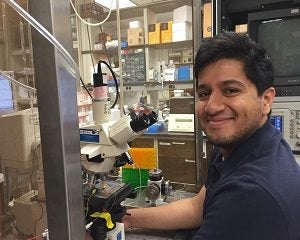Pharmacology
About
 The Ph.D. program in Pharmacology is designed to provide students with training in the Pharmacological Sciences and thus prepare them for a career in modern biomedical research. Through a combination of laboratory research and didactic coursework, our program prepares students to shape the future and leave a mark on the world by pioneering the development of exciting and powerful new treatments, cures, and therapies while expanding our knowledge of human disease. For more information, click here…
The Ph.D. program in Pharmacology is designed to provide students with training in the Pharmacological Sciences and thus prepare them for a career in modern biomedical research. Through a combination of laboratory research and didactic coursework, our program prepares students to shape the future and leave a mark on the world by pioneering the development of exciting and powerful new treatments, cures, and therapies while expanding our knowledge of human disease. For more information, click here…
Program Faculty
Abbas, Tarek A.
The Ubiquitin System and Human Cancer
Abbott, Stephen
Neurobiology of the autonomic nervous system and the homeostatic control of breathing
Bayliss, Douglas A.
Mechanisms of neuromodulation in central neurons
Beenhakker, Mark P.
Circuit mechanisms of sleep and epilepsy
Bland, Michelle
Molecular mechanisms linking innate immune and insulin signaling to control cell growth and metabolism
Desai, Bimal N.
Ion channels and Ca2+-signaling in inflammation, immunity and tissue homeostasis
Ebrahim, Seham
Cytoskeletal architecture, dynamics and roles in cellular physiology and disease; High-resolution live cell and tissue imaging
Ewald, Sarah
Innate immunity, chronic disease, host-parasite interactions, Toxoplasma gondii, proteomics
Eyo, Ukpong Bassey
Neuroscience
Ferris, Heather
Brain metabolism, cognitive decline, insulin signaling and Alzheimer's disease
Garrett-Bakelman, Francine
Acute Myeloid Leukemia: molecular and cellular biology events which mediate aberrant epigenetic and transcriptional mechanisms during disease establishment and progression
Gaultier, Alban
Exploring new therapeutics avenues to treat Multiple Sclerosis.
Harris, Tajie H.
Immune response to infectious disease in the CNS
Harris, Thurl E
Molecular mechanisms controlling insulin signaling and fat synthesis.
Isakson, Brant
Translating our discoveries in the microcirculation to tangible benefits in patients.
Leitinger, Norbert
Role of lipid oxidation products in inflammation and vascular immunology in atherosclerosis and diabetes
Levental, Ilya
Composition, Biophysics and Physiology of Cellular Membranes
Lynch, Kevin R.
Chemical biology of sphingosine 1-phosphate
Lynch, Wendy J.
Behavioral Pharmacology, Sex Differences, Animal Models of Addiction
Martens, Jeffrey
Pharmacology
Martin, Timothy Dean
Identifying tumor selective drug targets, Understanding the genetic drivers of tumor immune evasion
Perez-Reyes, Edward
Exploring epilepsy circuits then preventing seizures using gene therapies. Developing drug-inducible genetic switches for insulin replacement gene therapies.
Redemann, Stefanie
Chromosome segregation and aneuploidy in meiosis and mitosis
Saucerman, Jeffrey J.
Roles of complex signaling networks involved in the regulation of cardiovascular function and disease
Schulman, Ira G.
Regulation of transcription by nuclear hormone receptors, transcriptional control of metabolism and inflammation, small molecule approaches to drug discovery
Sheynkman, Gloria M.
Proteoform Systems Biology: proteogenomic approaches to uncover the role of proteomic variation in human disease
Sonkusare, Swapnil
Identify the calcium signaling abnormalities that lead to vascular dysfunction and blood pressure elevation in cardiovascular disorders
Sun, Shengyi Iris
Role of endoplasmic reticulum-associated protein degradation in health and disease
Winckler, Bettina
Endosomal function and dysfunction in neurons. Development of the nervous system: cytoskeleton and membrane traffic in axon and dendrite growth.
Wolf, Matthew J
Identification of genes and pathways that cause or modify cardiac hypertrophy and heart failure.
